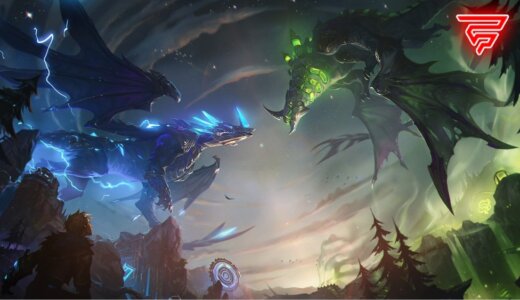League of Legends is one of the most popular multiplayer online battle arena (MOBA) games in the world, with millions of players logging in every day to compete against each other. However, with its highly competitive nature and addictive gameplay, many players find themselves struggling with League of Legends addiction. This addiction can have a significant impact on a player’s life, affecting their relationships, work or school performance, and overall mental and physical health.
League of Legends addiction is a real problem that affects players of all ages and backgrounds. It can be difficult to recognize, as many players may not realize that they are addicted until it begins to impact their daily life. Symptoms of League of Legends addiction include spending excessive time playing the game, neglecting other responsibilities, feeling anxious or irritable when not playing, and experiencing physical symptoms such as headaches or eye strain. It is essential to address these symptoms and seek help if necessary to overcome League of Legends addiction.
Understanding League of Legends
League of Legends (LoL) is a multiplayer online battle arena (MOBA) game that was released in 2009. It has gained immense popularity over the years, with millions of players worldwide. The game has a complex gameplay system that requires strategic thinking, quick reflexes, and teamwork.
In LoL, players control a champion with unique abilities and battle against a team of other players. The objective is to destroy the enemy team’s Nexus, a structure located in their base. Players earn gold and experience points by killing minions, monsters, and enemy champions. They can then use this gold to purchase items that enhance their champion’s abilities.
One of the reasons why LoL is so addictive is its competitive nature. Players can climb the ranked ladder by winning games and earn rewards such as exclusive skins and in-game currency. The game’s ranking system is based on a player’s skill level, which is determined by their win-loss ratio and performance in matches.
Another factor that contributes to the game’s addictiveness is its social aspect. Players can form teams with friends or join online communities to play together. The game also has a chat feature that allows players to communicate with each other during matches.
However, LoL addiction can have negative consequences on a player’s life. It can lead to decreased productivity, strained relationships, and even physical health problems such as eye strain and carpal tunnel syndrome. It is essential for players to set boundaries and limit their playtime to maintain a healthy balance between gaming and other aspects of their life.
Overall, understanding the addictive nature of LoL is the first step towards taking control of one’s gaming experience. By setting boundaries, limiting playtime, and balancing gaming with other aspects of life, players can enjoy the game without falling victim to addiction.
Identifying Addiction
Addiction to League of Legends can be difficult to recognize, as it is a complex issue that can manifest in different ways. However, there are some common signs that may indicate that someone is struggling with addiction.
Signs of League of Legends Addiction
Some signs that someone may be addicted to League of Legends include:
- Spending increasing amounts of time playing the game, to the point where it interferes with other aspects of their life such as work, school, or relationships.
- Feeling irritable, anxious, or depressed when unable to play the game.
- Neglecting personal hygiene, sleep, or nutrition in order to play the game.
- Losing interest in other hobbies or activities that were previously enjoyed.
- Continuing to play the game despite negative consequences, such as losing a job or failing a class.
It is important to note that not everyone who plays League of Legends is addicted, and some people may exhibit some of these signs without being addicted. However, if someone is exhibiting several of these signs and is unable to reduce their gaming behavior despite negative consequences, it may be worth considering whether they have an addiction.
Seeking Help
If someone believes they or a loved one may be addicted to League of Legends, it is important to seek help. There are many resources available, including support groups, therapy, and addiction treatment programs. It can be difficult to overcome addiction on one’s own, but with the right support and resources, recovery is possible.
Psychological Impact of Addiction
League of Legends addiction can have a significant psychological impact on players. The game’s complex mechanics and competitive nature can lead to players becoming obsessed with winning and ranking up, causing them to spend an excessive amount of time playing the game.
Studies have shown that gaming addiction, including League of Legends addiction, can lead to psychological problems such as depression, anxiety, and social isolation. In extreme cases, gaming addiction can also lead to suicidal thoughts and behavior.
One reason for this is that gaming addiction can interfere with a person’s ability to fulfill their responsibilities, such as work, school, and relationships. This can lead to feelings of guilt, shame, and hopelessness, which can exacerbate existing mental health issues.
Additionally, League of Legends addiction can create a sense of social isolation, as players may prioritize the game over spending time with friends and family. This can lead to a lack of social support, which is an important factor in maintaining good mental health.
It is important to note that not all players who enjoy League of Legends will develop an addiction. However, those who do should seek professional help to address the underlying psychological issues that may be contributing to their addiction. This may involve therapy, medication, or a combination of both.
Physical Consequences of Addiction
League of Legends addiction can have physical consequences on the body. Here are some of the potential effects:
1. Poor Nutrition
Addiction to video games can lead to poor eating habits and inadequate nutrition. Players may skip meals or choose unhealthy snacks while playing. This can lead to a lack of essential nutrients, which can cause fatigue, weakness, and other health problems.
2. Lack of Exercise
Playing video games for extended periods can lead to a sedentary lifestyle. This can result in a lack of physical activity, which can cause weight gain, muscle loss, and other health problems.
3. Eye Strain
Staring at a computer screen for long periods can cause eye strain, which can lead to headaches, blurred vision, and other symptoms.
4. Carpal Tunnel Syndrome
Repetitive motions, such as clicking a mouse or typing on a keyboard, can cause carpal tunnel syndrome. This condition can cause pain, numbness, and tingling in the hands and arms.
5. Sleep Deprivation
Playing video games late into the night can lead to sleep deprivation. This can cause fatigue, irritability, and other health problems.
It is important to note that not everyone who plays League of Legends will experience these physical consequences. However, it is essential to maintain a healthy balance between gaming and other activities to avoid potential health problems.
Addiction and Social Life
League of Legends (LoL) is one of the most popular online games in the world, with millions of players logging in every day to play. However, playing LoL for extended periods can lead to addiction, which can have a negative impact on a player’s social life.
Addiction to LoL can cause players to neglect their social relationships with friends and family. Players may choose to play LoL instead of spending time with loved ones, which can cause tension and conflict in relationships. This can lead to feelings of isolation and loneliness, which can exacerbate the addiction.
Moreover, players who are addicted to LoL may experience a decline in their social skills. They may find it difficult to communicate with others or engage in activities outside of the game. This can make it challenging for players to form new relationships or maintain existing ones.
In some cases, players may even experience financial difficulties as a result of their addiction. They may spend money on in-game purchases or subscriptions, which can lead to financial strain and debt. This can further exacerbate feelings of isolation and loneliness, as players may be unable to participate in social activities due to financial constraints.
In conclusion, addiction to LoL can have a significant impact on a player’s social life. Players who are struggling with addiction should seek help from a mental health professional or support group to address their addiction and improve their social relationships.
League of Legends Addiction in Youth
League of Legends (LoL) is one of the most popular online games in the world, with millions of players of all ages. However, it has been observed that LoL addiction is particularly common among young people.
Studies have shown that young people who spend more time playing LoL are more likely to experience negative consequences such as poor academic performance, social isolation, and physical health problems. This is because the game is highly addictive, with its fast-paced action, competitive gameplay, and social features that allow players to connect with others around the world.
Moreover, young people are more vulnerable to addiction due to their developing brains, which are more sensitive to the rewarding effects of video games. This is why it is important for parents and caregivers to monitor their children’s gaming habits and intervene if necessary.
Some signs that a young person may be addicted to LoL include:
- Spending excessive amounts of time playing the game
- Neglecting other responsibilities such as schoolwork or household chores
- Losing interest in other activities or hobbies
- Becoming irritable or agitated when unable to play
- Continuing to play despite negative consequences
If a young person is showing signs of LoL addiction, there are several steps that can be taken to help them overcome it. These include:
- Setting limits on screen time and gaming
- Encouraging participation in other activities such as sports or clubs
- Seeking professional help from a therapist or counselor
- Using parental controls or monitoring software to limit access to the game
Overall, LoL addiction is a serious issue that can have negative consequences for young people. By being aware of the signs of addiction and taking steps to prevent and treat it, parents and caregivers can help their children enjoy the game in a healthy and balanced way.
Treatment and Recovery
League of Legends addiction is a serious problem that can have a significant impact on a person’s life. Fortunately, there are several treatment options available for those struggling with this addiction.
One of the most effective treatments for League of Legends addiction is cognitive-behavioral therapy (CBT). This therapy helps individuals identify and change negative thought patterns and behaviors that contribute to their addiction. It also helps them develop coping mechanisms to deal with triggers and cravings.
Another effective treatment option is group therapy. This allows individuals to connect with others who are going through similar experiences and provides a supportive environment for recovery. Group therapy can also provide a sense of accountability, as members help each other stay on track.
In addition to therapy, there are several self-help strategies that individuals can use to overcome their addiction. These include:
- Setting boundaries: This involves setting limits on the amount of time spent playing League of Legends and sticking to them.
- Finding alternative activities: Engaging in other activities, such as exercise or hobbies, can help individuals fill the void left by gaming.
- Seeking support: Talking to friends and family members about the addiction can provide a sense of support and help individuals stay motivated.
It is important to note that recovery from League of Legends addiction is a process that takes time and effort. However, with the right treatment and support, it is possible to overcome this addiction and live a fulfilling life.
Preventing Addiction
Preventing addiction to League of Legends is easier than trying to overcome it. Here are some tips to help prevent addiction:
- Set a specific time limit for playing League of Legends each day and stick to it. This will help prevent excessive gaming and ensure that other important activities are not neglected.
- Prioritize other activities such as work, school, exercise, and socializing over playing League of Legends. This will help maintain a balance between gaming and other important aspects of life.
- Take breaks between gaming sessions to stretch, walk around, and rest the eyes. This will help prevent physical strain and fatigue associated with prolonged gaming.
- Avoid playing League of Legends when feeling stressed or anxious. Instead, find other ways to manage stress such as meditation, exercise, or talking to a friend.
- Join a support group or seek professional help if struggling with addiction to League of Legends. This can provide a safe and supportive environment to discuss addiction and receive guidance on how to overcome it.
By following these tips, individuals can prevent addiction to League of Legends and maintain a healthy balance between gaming and other important aspects of life.
Conclusion
League of Legends addiction is a real phenomenon that affects many players. The addictive nature of the game is due to a combination of factors, including engaging gameplay, social interaction, and psychological elements.
Players who are struggling with addiction should consider seeking help. There are resources available, including support groups and addiction treatment programs. It is important to acknowledge and accept the problem, and take ownership of the impact that the addiction is having on one’s life.
To avoid addiction, players can take steps such as setting limits on gameplay time, taking breaks, and engaging in other activities. It is also important to be aware of the signs of addiction, such as feeling irritable or anxious when not playing the game, neglecting other responsibilities, and experiencing negative consequences as a result of playing.
Ultimately, the decision to play League of Legends is up to the individual. However, it is important to approach the game with awareness and caution, and to prioritize one’s mental and physical health.
Frequently Asked Questions
What are the signs of video game addiction?
Some signs of video game addiction include neglecting personal hygiene, sleep, and meals, losing interest in other activities, and becoming irritable or defensive when asked to stop playing. Additionally, individuals may experience negative impacts on their work or school performance and social relationships.
How does playing video games affect the brain?
Playing video games can affect the brain in various ways. Studies have shown that playing video games can increase dopamine levels, leading to feelings of pleasure and reward. However, excessive gaming can also lead to changes in brain structure and function, including decreased gray matter in areas related to decision-making and increased activity in areas related to cravings and addiction.
What are some strategies for managing video game addiction?
Some strategies for managing video game addiction include setting limits on gaming time, finding alternative activities to replace gaming, seeking support from friends and family, and seeking professional help if necessary. It is also important to identify triggers and address underlying issues that may contribute to gaming addiction.
Can video game addiction lead to other health problems?
Yes, video game addiction can lead to other health problems, including physical health issues such as poor sleep, obesity, and carpal tunnel syndrome. It can also lead to mental health issues such as depression, anxiety, and social isolation.
How can I support a friend or family member struggling with video game addiction?
Supporting a friend or family member struggling with video game addiction involves being understanding and non-judgmental, listening to their concerns, and encouraging them to seek help if necessary. It is also important to set boundaries and encourage healthy habits, such as exercise and socializing.
What resources are available for those seeking help with video game addiction?
There are various resources available for those seeking help with video game addiction, including support groups, online forums, and counseling services. Additionally, some treatment centers specialize in gaming addiction and offer specialized programs to help individuals overcome their addiction. It is important to research and find a reputable source of help.







